 It was fortunate to get in touch with this band as it gives a new perspective to the mix of interviews here: a black metal band from Israel who are pro-Israel and pro-Judaism/Jewish culture, from the sounds of what they say here. Because of linguistic confusion, it was hard to figure out exactly where they stand on many issues and Ze’ev declined to answer some of the “hot issue” questions, but what is remarkable revealed here is the attitudes toward black metal of people living in a place that to most of us, is inconceivably remote and linked to one of the great enemies of black metal, Jehovah. Many thanks to Ze’ev for taking a chance on us and giving a lengthy interview which was interrupted only when Palestinians in bulky overcoats began to arrive nearby…
It was fortunate to get in touch with this band as it gives a new perspective to the mix of interviews here: a black metal band from Israel who are pro-Israel and pro-Judaism/Jewish culture, from the sounds of what they say here. Because of linguistic confusion, it was hard to figure out exactly where they stand on many issues and Ze’ev declined to answer some of the “hot issue” questions, but what is remarkable revealed here is the attitudes toward black metal of people living in a place that to most of us, is inconceivably remote and linked to one of the great enemies of black metal, Jehovah. Many thanks to Ze’ev for taking a chance on us and giving a lengthy interview which was interrupted only when Palestinians in bulky overcoats began to arrive nearby…
What is the difference between humans and animals?
The difference between humans and animals is that animals act with their instincts alone and that is why you can’t accuse them of animalistic behavior.
Do you believe that a deity exists, as a physical or otherworldly manifestation outside of the world of symbols?
I’m not a religious person, I think everyone can believe in what they want as long as they don’t hurt anyone and as long as they don’t force you to think like them. I don’t believe in god the way most people do, I think “god” is the good things in everyone
What do you see as the ideals shared by black metal bands? If you see no shared ideals, please describe how we have all arrived at roughly similarly sounding music.
In my opinion, Black metal especially share style, subjects and visuallity, this style fits dark subjects and that is why the music sounds similar and you can define a band as black metal.
What are the historical origins of black metal music?
I think “Venom” brought this style.
When you founded salem (in 1985, as your bio claims) what bands were influencing you then and what do you feel you added to metal at the time?
Salem was formed in 1985, at the time our main influences were “venom”, “slayer” “black sabbath” et cetera. I think “Salem” and bands like “Mayhem” “Masacre” “Merciless” et cetera, brought the next generation to metal with new ideas, new instruments and more…
How would you describe the music you have written for Collective Demise?
“Collective demise” is very aggressive, although it has a lot of melodies and harmonies. I think that “Collective demise” reflects a certain adolescence of Salem, the fact that it’s more aggresive and much faster distinguish it from our previous releases.
“Collective Demise” contains 12 new songs which textually are snapshots of our reality since September 2001 and musically explore new territories; The use of Afro-Cuban Percussion on “Dead Eyes” and “Slave”, Arabic darbuka on “Broken Yet United” and “Act of Terror”, female vocals on “Coming End of Reason”, “Feed on Your Grief”, “Act of War” and “Al Taster” and the most sophisticated second guitar harmonies ever submitted to reel.
“Al Taster” is also the first single and video off the album released in Israel on June 19th 2002. This song is a cover of an old Jewish hymn. Lyrics are taken from Psalms, chapter 102, verse 3.
This album is the first Salem offering for KMG/ System Shock in Germany. Earlier this year Salem signed a 3-album contract with this well-established label.
Psalm 102: A prayer of an afflicted man. When he is faint and pours out his lament before the LORD.
1 Hear my prayer, O LORD ;
let my cry for help come to you.
2 Do not hide your face from me
when I am in distress.
Turn your ear to me;
when I call, answer me quickly.
3 For my days vanish like smoke;
my bones burn like glowing embers.
4 My heart is blighted and withered like grass;
I forget to eat my food.
5 Because of my loud groaning
I am reduced to skin and bones.
6 I am like a desert owl,
like an owl among the ruins.
7 I lie awake; I have become
like a bird alone on a roof.
8 All day long my enemies taunt me;
those who rail against me use my name as a curse.
9 For I eat ashes as my food
and mingle my drink with tears
10 because of your great wrath,
for you have taken me up and thrown me aside.
11 My days are like the evening shadow;
I wither away like grass.
12 But you, O LORD , sit enthroned forever;
your renown endures through all generations.
13 You will arise and have compassion on Zion,
for it is time to show favor to her;
the appointed time has come.
14 For her stones are dear to your servants;
her very dust moves them to pity.
15 The nations will fear the name of the LORD ,
all the kings of the earth will revere your glory.
16 For the LORD will rebuild Zion
and appear in his glory.
17 He will respond to the prayer of the destitute;
he will not despise their plea.
18 Let this be written for a future generation,
that a people not yet created may praise the LORD :
19 “The LORD looked down from his sanctuary on high,
from heaven he viewed the earth,
20 to hear the groans of the prisoners
and release those condemned to death.”
21 So the name of the LORD will be declared in Zion
and his praise in Jerusalem
22 when the peoples and the kingdoms
assemble to worship the LORD .
23 In the course of my life he broke my strength;
he cut short my days.
24 So I said:
“Do not take me away, O my God, in the midst of my days;
your years go on through all generations.
25 In the beginning you laid the foundations of the earth,
and the heavens are the work of your hands.
26 They will perish, but you remain;
they will all wear out like a garment.
Like clothing you will change them
and they will be discarded.
27 But you remain the same,
and your years will never end.
28 The children of your servants will live in your presence;
their descendants will be established before you.”
In your bio it says: “Kaddish” also featured a cover song called “Ha’ayara Bo’eret” (the town is on fire), a song that is being associated with The Holocaust. This national controversy found its way to the Israeli parliament for a discussion of whether or not it is appropriate for a metal band to play such songs.
Why would it be inappropriate for a metal band to cover such songs?
This is a very sensitive subject and some people thought the music is too aggresive, but eventually we decided that it is appropriate to cover songs like that, and that is why we did it, after all we are a democratic country with freedom of speech.
What do you think are the causes of the current conflict between Iraq, Afghanistan and the USA?
T E R R O R!!!
It seems to me Israel and the USA are similar, in that both are countries of immigrants founded for religions reasons. Do you see this as true?
There is no doubt that Israel and USA are similar, except i don’t think that Israel was founded for religions reasons only, The main reson was Zionism.
What is like living in a place that is currently under somewhat warlike conditions?
In Israel it’s impossible to ignore the news since it has a direct effect on your daily life and as a result you have songs. It’s hard to cope with the fear of being somewhere crowded (like busses, restaurants, or even live shows) without knowing how it will end. The fact that innocent civilians are dying gives you an helplessness feeling. It is difficult for us to see a solution for it right now, but we don’t know what tomorrow will bring – therefore we try to keep hoping.
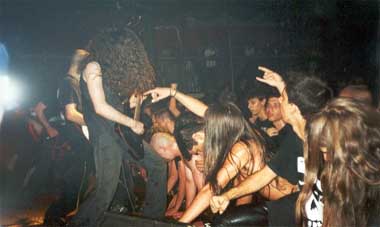
How do you feel toward the Palestinians who live in Israel?
I don’t have a problem with the palestinians who live in Israel, i think they are suffering because a minority of fanatical who believe in terror.
Why do you think the UN decided Israel should be created in the first place?
Well, the Jews were living all over the world, they had no country, and they suffered holocaust all over Europe, 6,000,000 was killed! that fact shocked the whole world and the result was that the UN decided to create Israel. ( It’s a pity that 6,000,000 had to die so that we’ll have a country).
When you are writing songs, how do you create them – from lyrics, from a melody, or from a general concept? Which members write most of the songs?
Every member of the band is writing material, and in most cases We are all meeting, listening to it and choosing what we like, eventually we build song, after that we are writing a lyrics to it. When the song is ready, We can change it , so a song is not realy ready until we record it
Do you think metal is an expression of rebellion, or does it have deeper significance?
Maybe in the past it was some kind of rebellion, but today,in my opinion, it has lot of significance, otherwise i wouldn’t keep doing it for so many years!
In America, we have fanatical Christians who both would like us to make war on Iraq but also would like to ban certain types of metal. Do you have a comment on that?
I don’t think it’s right to ban music. We are living in democratic countries and we have the freedom of speech and creation . About making war with Iraq – I think Iraq is a country that supports and exportes terror, so USA have to do something to stop it.
How is Christianity viewed in Israel?
Israel is a country that contain all the religions. We think everyone can believe in anything as long as you don’t force your opinion on us.
Do you have any anti-Christian lyrics?
No.
Do you feel you have gotten the right promotion for a band that has been around since 1985?
We didn’t get the right promotion because our old record companies saved money on publicity and tours. We were very disappointed, but i hope our new record company – KMG/System shock will do much better work.
Do you like any current black metal bands and if so, who?
of course! bands like “Limbonic art”, “Arallu”, and more…
If you could tour the world with any band, who would it be?
“Kreator”
Are there many metal bands in Israel?
The metal scene in Israel is great, we have some good bands with a lot of potential like: “Arallu”, “Nail-Within”, “Lehavoth”, “Untropia”, “Meleches”, “Orphaned Land” A lot of kids listen to metal and support it and come to live shows.
Have there been any church-burnings, or temple-burnings (not sure if I have the right word there) from black metal where you live?
No. Never.
What is your stance on the concept and spiritual significance of grave desecrations?
I think it horrible! not bcause of the deads, but because of the people who love them, and want to use this place to remember them.
Do you see there as being a difference between commercial metal bands and underground metal?
There is a difference, underground metal don’t compromise and that is why they aren’t earning money like the commercial metal bands.
What’s next for Salem?
A European tour, The release of album Number 5, and then we’ll see. We want to remain active as long as we feel that we have something to say and that there’s someone who’s interested to hear it. Salem try to be as much original and come up with good material cause we work a lot on the songs to make them interesting and have no rush to write songs that will end up being crap in the end. We will continue as long as we have support from our fans in Israel and worldwide.
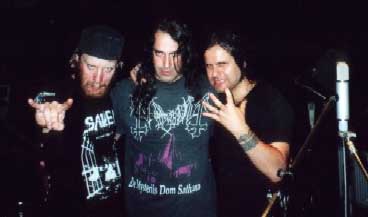
What do you do outside of the band for intellectual, physical and spiritual stimulation?
First of all, I have a family – a wife and a beutiful girl, and i like being with them, I also like exercise Martial art “Tai-box”, create web sites, playing with Salem, and helping metal bands- I produced several bands like “Arallu”, “Azazel” ,”Aztec”, “Betrayer” , and i just returned from germany, helping producing “Nail within” with Harris Jones.
Do any members of Salem use drugs?
We don’t do drugs. We once had a member in Salem that used drugs and the result of that is that he is in psychiatric hospital to this very day. that freaked us out.
Some blackmetallers think that the music should be all about death, no hope, total destruction, watching the earth burn, etc. Others have families and lives outside of the musical scene. Do you have families? What is your feeling on this attitude?
As i mention before, i have a wonderful family. I’m against death and destruction, but the music is about those things because we’re living in it.
At what moment did you first feel like a “real band” or think, “wow, this is going to be our future”?
The day we recieved our first album and i held it!
In ancient mysticism, man was not viewed as separate from nature. Do you think this view has changed?
People ruined most of nature, and separated themeselves from it.
Is it possible that humans influence the outcome of events with their thoughts alone?
People, and their actions causes the outcomes! I dont think that a bus or a restaurant or even the twin towers exploded because of thoughts alone.
Do you believe UFOs visit Earth and if so, are they alien visitors or do they have malevolent intent?
I think it pretentious to think that we are alone in the universe. I don’t know what their intentions, maybe they just curious, wouldn’t you be? :-)
Do you believe in “good” and “evil”?
Yes. I believe that everyone has good and evil in him.
Thank you very much for your support. Keep metal alive! For more information about Salem, you can visit our web site: http://www.salemband.com
One would be bound to despair of our national character, too, if it had already become so inextricably entangled in its culture, indeed entirely at one with it, as is horrifyingly evident in the case of civilized France; the very thing which was France’s great advantage for a long time, and the cause of its vast superiority, namely the identity of people and culture, should now, as we contemplate the consequences, make us thank our good fortune that this questionable culture of ours still has nothing in common with the noble core of our national character. Instead, all our hopes reach out longingly towards the perception that beneath this restlessly agitated cultural life and senseless education there lies hidden a magnificent, inwardly healthy, ancient strength, which admittedly only stirs powerfully in momentous times and then returns to dreaming of some future awakening.
– F.W. Nietzsche, The Birth of Tragedy
No Comments In an interview with Norwegian news site The Foreigner, legendary black metal producer Erik ‘Pytten’ Hundvin — whose greatest effort lies in producing classics by Burzum, Emperor, Enslaved, Gorgoroth, Immortal and Mayhem — answers questions about the whys and wherefores of the genre.
In an interview with Norwegian news site The Foreigner, legendary black metal producer Erik ‘Pytten’ Hundvin — whose greatest effort lies in producing classics by Burzum, Emperor, Enslaved, Gorgoroth, Immortal and Mayhem — answers questions about the whys and wherefores of the genre.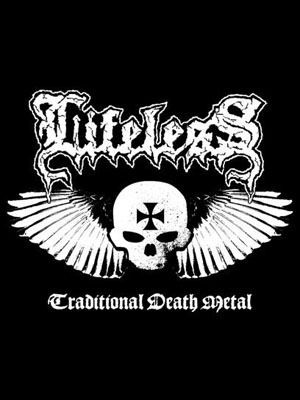 When you review underground metal these days, bands skim across your desk like frisbees flung by absent-minded demons. Most of them skitter and disappear over the other side as you listen, realize it’s about the same, and then move on. Others stick around because they’ve got some spirit or animating force that makes them stand out, and motivates them to write better music.
When you review underground metal these days, bands skim across your desk like frisbees flung by absent-minded demons. Most of them skitter and disappear over the other side as you listen, realize it’s about the same, and then move on. Others stick around because they’ve got some spirit or animating force that makes them stand out, and motivates them to write better music.
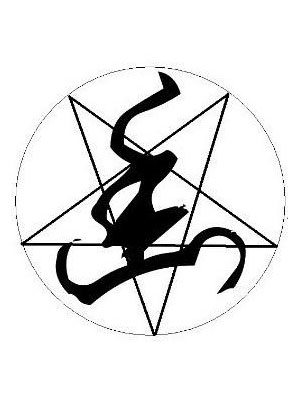

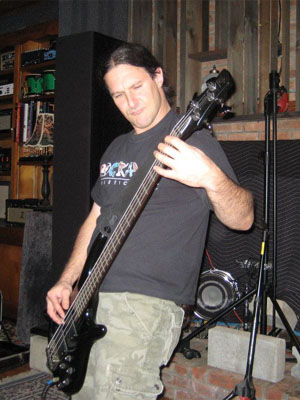 NYDM founders Immolation are in the studio and preparing work on their ninth full-length album, according to
NYDM founders Immolation are in the studio and preparing work on their ninth full-length album, according to  It was fortunate to get in touch with this band as it gives a new perspective to the mix of interviews here: a black metal band from Israel who are pro-Israel and pro-Judaism/Jewish culture, from the sounds of what they say here. Because of linguistic confusion, it was hard to figure out exactly where they stand on many issues and Ze’ev declined to answer some of the “hot issue” questions, but what is remarkable revealed here is the attitudes toward black metal of people living in a place that to most of us, is inconceivably remote and linked to one of the great enemies of black metal, Jehovah. Many thanks to Ze’ev for taking a chance on us and giving a lengthy interview which was interrupted only when Palestinians in bulky overcoats began to arrive nearby…
It was fortunate to get in touch with this band as it gives a new perspective to the mix of interviews here: a black metal band from Israel who are pro-Israel and pro-Judaism/Jewish culture, from the sounds of what they say here. Because of linguistic confusion, it was hard to figure out exactly where they stand on many issues and Ze’ev declined to answer some of the “hot issue” questions, but what is remarkable revealed here is the attitudes toward black metal of people living in a place that to most of us, is inconceivably remote and linked to one of the great enemies of black metal, Jehovah. Many thanks to Ze’ev for taking a chance on us and giving a lengthy interview which was interrupted only when Palestinians in bulky overcoats began to arrive nearby…


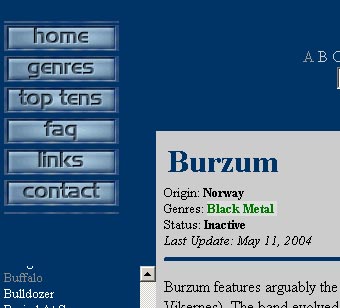
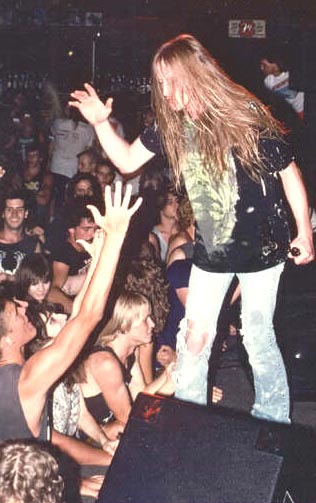 You are writing a book on your experiences, including rigor mortis. How does writing compare to music writing?
You are writing a book on your experiences, including rigor mortis. How does writing compare to music writing?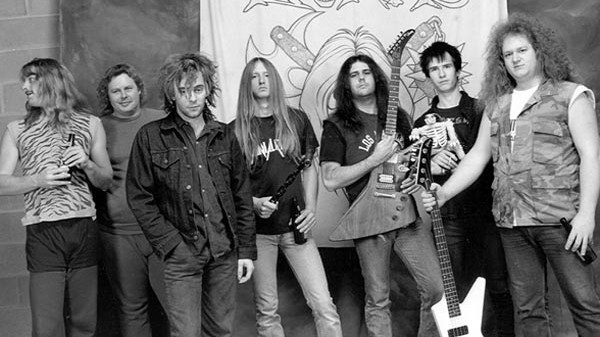
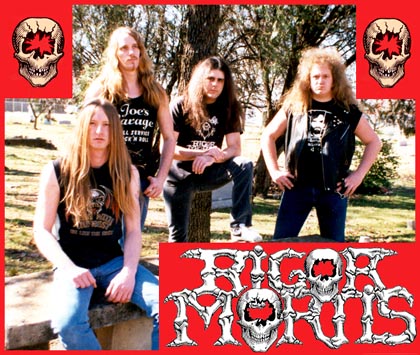 If you did form a metal band again, what kind of music would you make?
If you did form a metal band again, what kind of music would you make?
